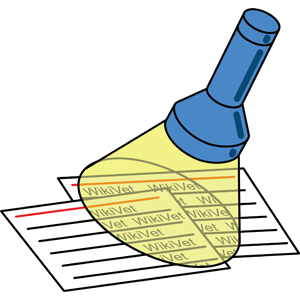Difference between revisions of "Category:Equine Orthopaedics and Rheumatology Q&A"
Jump to navigation
Jump to search
| Line 40: | Line 40: | ||
<br><br> | <br><br> | ||
{{Stephen May | {{Stephen May | ||
| − | | | + | |date = July, 2011 |
}} | }} | ||
Revision as of 17:23, 4 August 2011
Equine Orthopaedics and Rheumatology Flashcards provided by Manson Publishing
This category contains Equine Orthopaedics and Rheumatology Q&A flashcards provided by Mansons publishing, as part of the OVAL Project. Each flashcard consists of descriptions of an Equine case with questions and answer.
These questions are taken from the Equine Orthopaedics and Rheumatology Self-Assessment Colour Review book which features a total of 210 questions.
Content
- Rapid deterioration of lameness
- Young Thoroughbred with mild chronic bilateral forelimb lameness
- A 2-year-old Thoroughbred colt off its food
- A 9-year-old pony mare with mild hindlimb lameness of two months duration, which has not responded to rest.
- A 16-year-old Thoroughbred mare which had shown progressive hindlimb ataxia over 18 months
- Pony born and bred in England, presented for a problem of the hindquarters, with no history of lameness.
- Forelimb lameness, insidious in onset, unimproved with rest or exercise.
- Moderate, sudden onset hindlimb lameness after a fall.
- Lameness which occurred during hard exercise.
- Sudden onset forelimb lameness in 10-year-old Quarterhorse.
- Hindlimb injured on wire fence.
- Small skin wound, over large soft tissue swelling, which has failed to heal with antibiotics.
- Yearling thoroughbred with hindlimb lameness.
- 6-month-old thoroughbred foal with lameness of carpus and associated effusion.
- Forelimb lameness at trot, increased when trotted on a circle, with lame leg to outside.
- Soft swelling on hindlimb, not associated with any marked lameness and not history of trauma.
- Soft swelling over carpus, no associated weight-bearing lameness.
- Severe forelimb lameness after removal of nail from foot.
- Slight hindlimb lameness, associated with enlarged foot.
- Small discharging wound above coronary band of hindlimb.
- Foal unable to stand at birth.
| These questions have been expert reviewed by Prof Stephen May MA VetMB PhD DVR DEO FRCVS DipECVS Date reviewed: July, 2011 |
Pages in category "Equine Orthopaedics and Rheumatology Q&A"
The following 21 pages are in this category, out of 21 total.
E
- Equine Orthopaedics and Rheumatology Q&A 01
- Equine Orthopaedics and Rheumatology Q&A 02
- Equine Orthopaedics and Rheumatology Q&A 03
- Equine Orthopaedics and Rheumatology Q&A 04
- Equine Orthopaedics and Rheumatology Q&A 05
- Equine Orthopaedics and Rheumatology Q&A 06
- Equine Orthopaedics and Rheumatology Q&A 07
- Equine Orthopaedics and Rheumatology Q&A 08
- Equine Orthopaedics and Rheumatology Q&A 09
- Equine Orthopaedics and Rheumatology Q&A 10
- Equine Orthopaedics and Rheumatology Q&A 11
- Equine Orthopaedics and Rheumatology Q&A 12
- Equine Orthopaedics and Rheumatology Q&A 13
- Equine Orthopaedics and Rheumatology Q&A 14
- Equine Orthopaedics and Rheumatology Q&A 15
- Equine Orthopaedics and Rheumatology Q&A 16
- Equine Orthopaedics and Rheumatology Q&A 17
- Equine Orthopaedics and Rheumatology Q&A 18
- Equine Orthopaedics and Rheumatology Q&A 19
- Equine Orthopaedics and Rheumatology Q&A 20
- Equine Orthopaedics and Rheumatology Q&A 21


